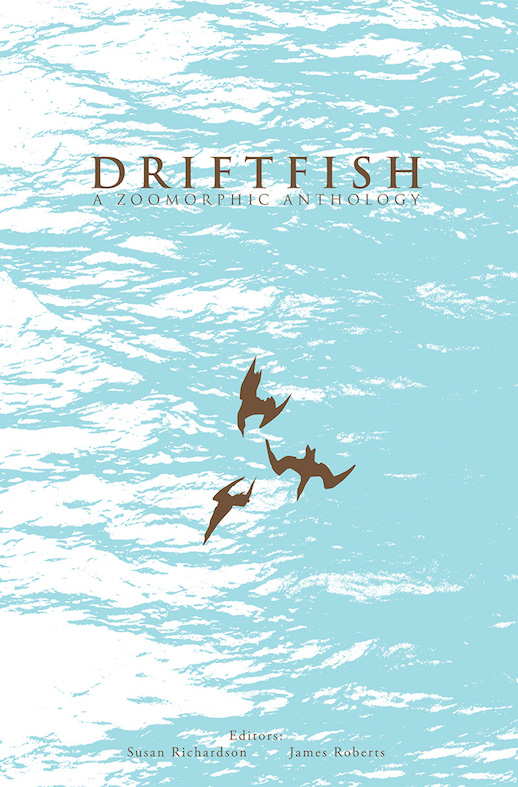
Danny Adcock reviews Driftfish – the new print anthology of essays, fiction and poetry from Zoomorphic:
We are living, apparently, in a ‘post-truth’ world; a world in which its most powerful country has elected as its next president a man who doesn’t believe climate change is real, and who has just appointed as his Secretary of Defence a man with the nickname ‘Mad Dog’; where, according to forestry groups, England is slipping into a state of deforestation for the first time in forty years because we are now felling more trees than we are planting; where the press is full of warnings of ecological and climatological ‘tipping points’ from which there is no going back; where temperatures in the Arctic are a staggering twenty degrees centigrade higher than expected; where recent political and cultural upheavals have exposed deep divisions in society. There is nothing ‘post-truth,’ about Driftfish: A Zoomorphic Anthology. The truths of these essays and poems, all concerning marine wildlife, are truths of loss, of connections and reconnections, of a search for meaning within our own increasingly complex lives through the ultimately uncomplicated ones lived by our kindred species. The first print offering from online magazine Zoomorphic, it continues the editors’ – poet, performer and educator Susan Richardson, and artist, designer and writer James Roberts – philosophy of publishing prose and poetry that nurtures our connections with nature, on both an intellectual and a physical level.
Driftfish begins at the beginning. At the top of a mountain in Wyoming, Anja Semanco finds the ‘footprints of creation.’ Where once they stood at the ocean’s bottom like ‘Grecian pillars,’ now the ‘hillside is strewn with bits of stromatolites.’ These are the fossilised remains of what is believed to be the very first lifeforms to emerge from the swirling cocktail of water, molten rock and unimaginable lengths of time. The contrast between the length of time these fragments of fossilised life have been here, and the speed at which life is disappearing today, is breathtakingly implied in her hurry to reach these fossils for fear they could ‘dissolve,’ as she approaches.
Semanco, and the rest of Driftfish’s writers and poets, seem to be fighting against fossilisation, against the concreting of nature into the past. The argument is that we cannot let species harden into memory alone, and then dissolve into a pixelated, painted, taught existence. Many of the poems and prose essays are about the pure exhilaration of wildlife encounters, and the intimacy with nature that they provide. Whether those encounters involve fossils, counting arctic terns on a Scottish island, or the rapture of a swim with manta rays and whale sharks, each encounter creates a memory that must be repeatable; a memory that others can be inspired to seek, and so create again. And, of course, the only way memories are repeatable is if the objects of those memories continue to live and exist in our reality. That some of the encounters may appear exotic and out of reach is irrelevant; it is the idea that is important. The insignificant and the ordinary are as vital as the spectacular and the extraordinary, and are just as worthy of – and in need of – protection.
There’s a sense of kinship with nature in Driftfish. Try as some might to insulate themselves from the natural world, to fence and wall it out, to double and triple glaze it beyond earshot, our fates are intertwined with it. Many of us are either ignoring this fact, or are utterly in ignorance of it. In her poem Kapalua, Jill Barrie’s kinship is apparent in her swim ‘with the grace of an angelfish/ through blue ulua and Moorish idols.’ The steady rhythm and alliteration of ‘parrotfish, triggerfish, saddle wrasse and rays’ heightens our sense of her gliding strokes through Hawai’i’s blue waters. It’s as if she has her ear to the chest of nature itself as ‘Waves charge the reef, retreat, in the pattern/ of a heartbeat.’ In Bottom of the Food Chain, James Michael Dorsey’s kinship is with the orcas off the coast of British Columbia amongst whom he kayaks. This kinship is shown in a heart-stopping experience when a huge bull keeps pace alongside him, allowing him into their world: ‘For a brief time there is nothing but the two of us, moving as one, and if ever an animal gave a gift to a man, then this is mine.’ The irony is plain to see for anyone who has followed the story of captive orcas over the last few years.
To review an anthology is to leave much unsaid, or put to one side; mentioning every author, every poem and essay is impossible. It is also pointless to leave nothing remaining for readers to interpret in their own ways. The world may be getting smaller, but it is still a place of wonder, still a place full of memories to be made, re-made and defended. The loss of places we can label ‘Here be dragons,’ doesn’t mean there is nothing left to discover, it just means we have to explore the edges of ourselves to help us find those places. It is for this reason I haven’t reviewed more of the individual poems and stories, but have tried to convey what I have taken as the book’s message. Others may interpret it differently.
Nature is a sublime experience, and that is captured throughout this anthology. Ultimately, the allegory of Driftfish, gathered here in its poems, essays and artwork, is to go out and make your own connections, your own memories, and ensure that they, and the nature that inspires them, are still there to be found when the next generation goes looking.
*
Driftfish is available to purchase here.